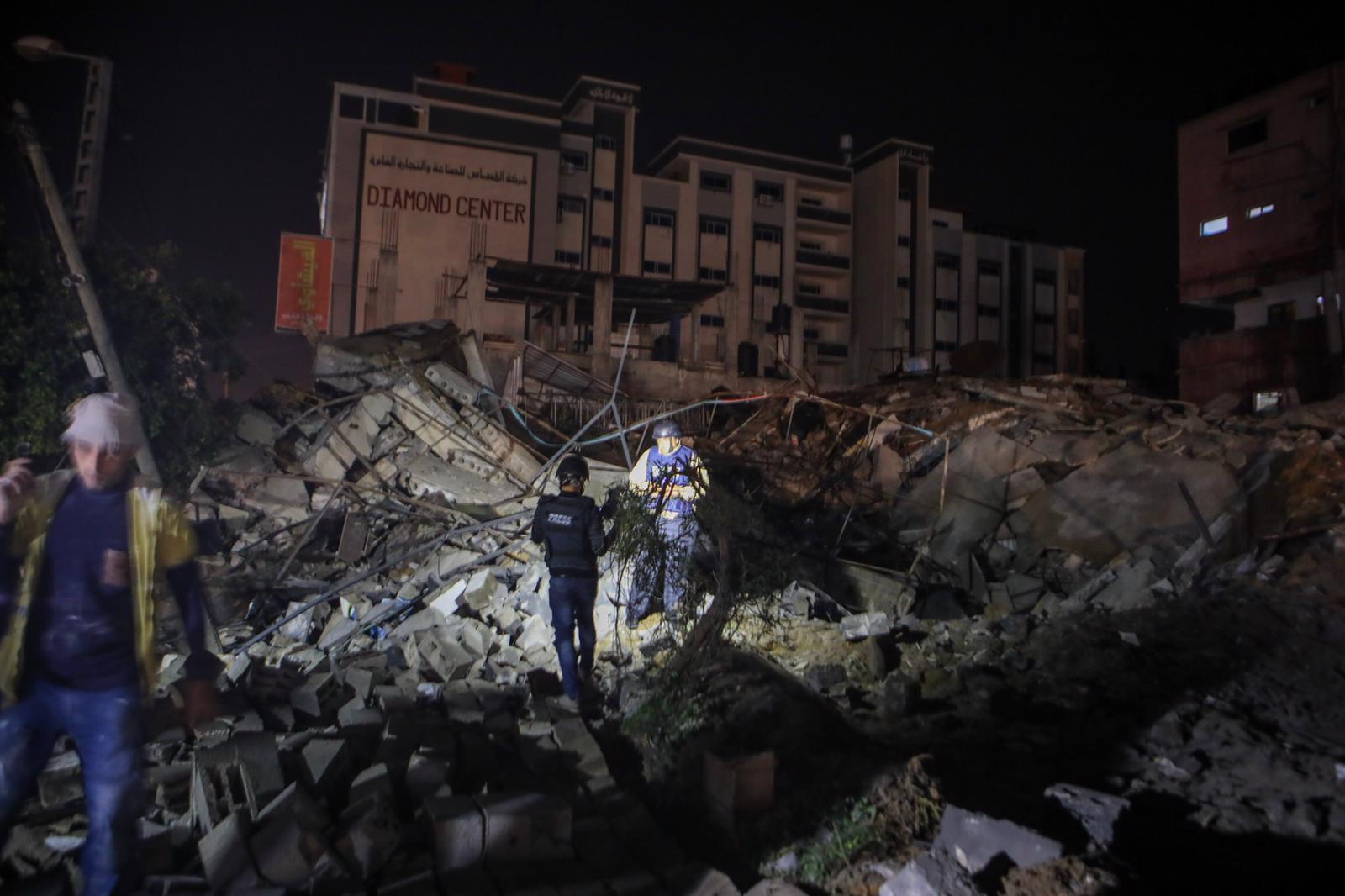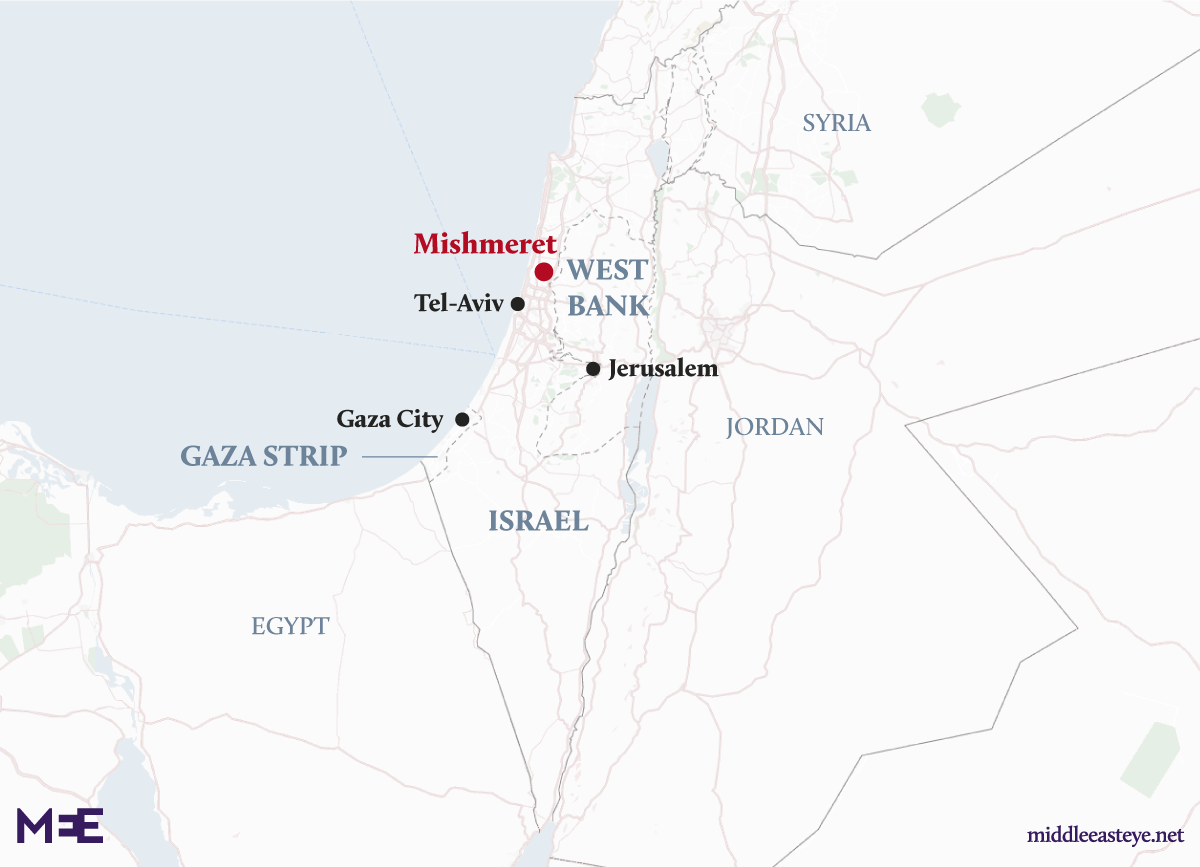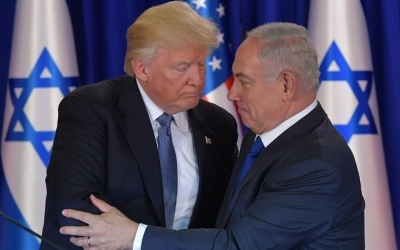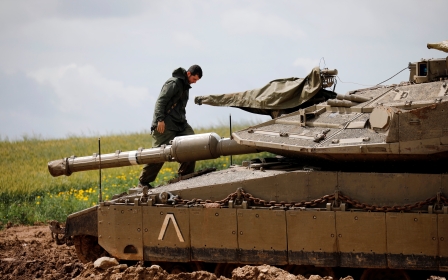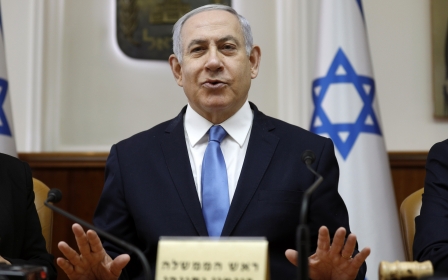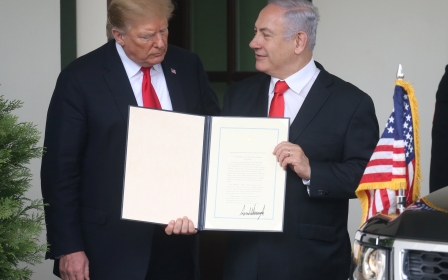Hamas says ceasefire reached after Israeli air strikes on Gaza Strip
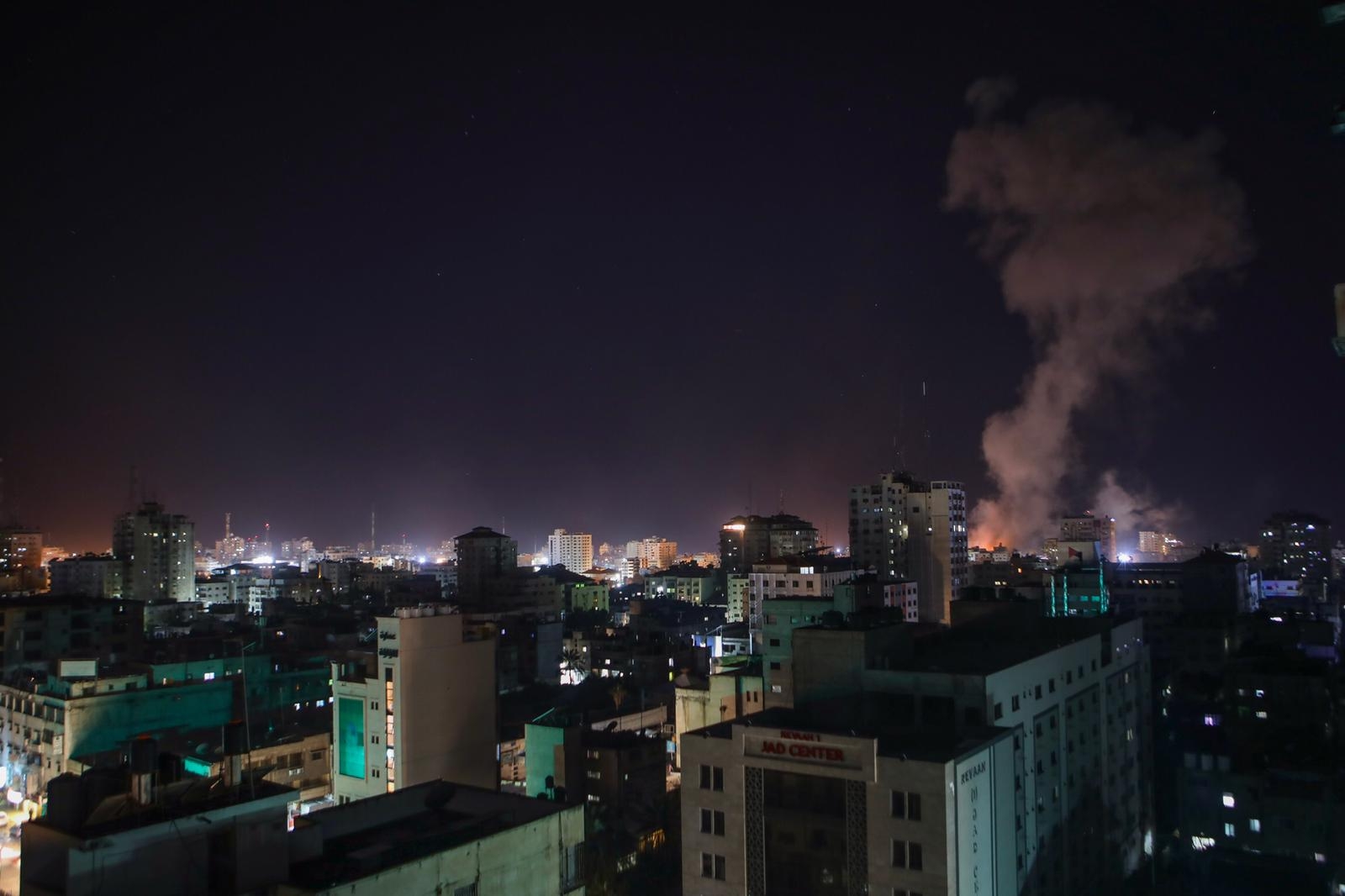
A Hamas spokesman said a ceasefire has been reached with Israel after the Israeli army carried out several air strikes on the besieged Gaza Strip.
In a brief statement late on Monday, Hamas spokesman Fawzi Barhoum said Egypt helped broker a ceasefire between Israel and armed Palestinian factions in Gaza, as reported by local media.
Hamas did not immediately provide any additional details about the agreement.
The ceasefire, which was first reported by Hamas-affiliated news outlets, comes after Israeli forces launched several air strikes against what it described as "Hamas terror targets" in the Gaza Strip.
The air strikes were launched several hours after a missile fired from the besieged Palestinian territory hit a town in central Israel.
New MEE newsletter: Jerusalem Dispatch
Sign up to get the latest insights and analysis on Israel-Palestine, alongside Turkey Unpacked and other MEE newsletters
The uptick in violence sparked fears that a wide-scale Israeli bombing campaign could be imminent.
Citing an unnamed Hamas official, Reuters reported that the truce went into effect at 10pm local time.
"An agreement on a ceasefire was reached between Palestinian factions and Israel upon Egyptian mediation," the official told the news agency.
Israel did not immediately comment on reports of the ceasefire, Reuters said.
Earlier on Monday evening, Reuters reported that an Israeli air strike targeted Hamas leader Ismail Haniyeh's office in Gaza.
Haniyeh was unlikely to have been there, as Hamas routinely evacuates its buildings when expecting Israeli attacks, the news agency said. An Israeli military spokesman declined to comment on the report.
The Hamas movement rejected the Israeli army's accusation that it carried out the rocket strike on Monday morning, which injured seven people in the Israeli town of Mishmeret.
Palestinian security officials and Hamas media outlets said the Israeli air strikes hit a Hamas naval position west of Gaza City, as well as a large training camp in northern Gaza.
Both positions were likely to have been evacuated, as Hamas had hours of notice that Israeli strikes were coming. Witnesses said three missiles hit the northern target.
Mohammed Ghazali, a Palestinian father in central Gaza City, said an Israeli soldier called him to say that he and his family had only minutes to evacuate their home.
'They said no one can remain in the area. We said, 'We have little kids, where would I take them?''
- Mohamad Ghazali, Gaza City resident
"They said no one can remain in the area. We said, 'We have little kids, where would I take them?" Ghazali told MEE.
Ghazali said his family left with nothing but the clothes on their backs and that moments later, several missiles hit their home.
He added that he didn't understand why the house was targeted, as there are no armed groups in the neighbourhood.
In a statement before the alleged attack on his office, Haniyeh said that "the Palestinian issue is going through a large-scale attack at all levels: in Jerusalem, in the West Bank, in the Gaza Strip, and inside the Israeli jails".
He said Palestinians "would not surrender to the Israeli occupation", pledging that "if the Israeli occupation crosses the red lines, the Palestinian resistance would respond consequently".
That was echoed by Ziyad al-Nakhleh, the secretary general of Islamic Jihad, an armed group operating in Gaza, who said it "will respond harshly to any Israeli aggression against Gaza".
Yahya Sinwar, the head of Hamas, which governs the besieged coastal enclave, cancelled a planned public meeting scheduled for Monday afternoon, with Hamas officials citing "developments".
Meanwhile, speaking in Washington DC earlier on Monday, Israeli Prime Minister Benjamin Netanyahu said that Israel "will do whatever it must do to defend its people. Israel will not tolerate rocket attacks on its territory".
US President Donald Trump also said that Israel "has the right to defend itself".
Rockets hit north of Tel Aviv
Earlier in the day, one house was completely destroyed and at least one other house and several cars were left badly damaged after rockets landed in the Israeli farming community of Mishmeret, about 20km northeast of Tel Aviv.
The strike came minutes after the Israeli military activated air raid sirens in the area and said one rocket had been launched from the Gaza Strip.
The Israeli military said the rocket was fired from a Hamas position near Rafah in southern Gaza.
But the source of the rocket-fire remained unclear on Monday.
"No one from the resistance movements, including Hamas, has an interest in firing rockets from the Gaza Strip towards the enemy," an unnamed official told AFP on condition of anonymity, evoking the possibility that "bad weather" may have been to blame.
In at least one previous instance in which Hamas and other militant groups denied firing rockets at Israel, they evoked the possibility that a thunderstorm had triggered a rocket launch.
It remained unclear if the official interviewed by AFP on Monday was alluding to a similar scenario.
Still, Israeli army spokesman Ronen Manelis said on Monday morning that two brigades were heading south towards Gaza and that the army was calling up thousands of reserve soldiers, including reservists from the Israel air force, Israel's Haaretz newspaper reported.
The hospital treating the wounded said seven Israelis were injured lightly by burns and shrapnel, including an infant, a three-year-old boy, a 12-year-old girl and a 60-year-old woman. Six of them were members of the same family.
The early morning attack came at a time of heightened tensions ahead of the anniversary of the Great March of Return protests in Gaza at the weekend, and as Netanyahu visits Washington amid his ongoing campaign for a fifth term in the 9 April elections in Israel.
Netanyahu said he was cutting short his trip to the United States, where he was scheduled to speak at the pro-Israel AIPAC lobby conference, due to the attack.
"In light of the security events I decided to cut short my visit to the US," Netanyahu said, calling the attack a heinous crime that would draw a strong Israeli response.
Before flying back, however, he met with Trump at the White House, where the pair held a news conference to announce that Trump had signed an executive order recognising Israeli "sovereignty" over the Syrian Golan Heights.
US-based analysts said the announcement may serve to boost Netanyahu's prospects in next month's election.
Netanyahu's chief rival in the upcoming vote, ex-general Benny Gantz, who was also in Washington to attend the AIPAC conference on Monday, accused Netanyahu after the rocket attack of having "bankrupted national security".
Evacuations across Gaza
In the wake of the Mishmeret rocket attack, the Israeli navy prevented Palestinian fishermen from sailing off the shores of Gaza.
They also closed both the Karam Abu Salem and Beit Hanoun crossings, which are used to transport goods and people, respectively.
The Israeli army also declared several areas in southern Israel closed military zones, while the Tel Aviv municipality opened a number of bomb shelters to the public.
Meanwhile, Palestinian governmental buildings, schools, prisons, and police and security stations in Gaza were evacuated on Monday in anticipation of potential Israeli bombings.
The headquarters of Al-Aqsa TV station was shut amid fears that it too could be targeted by Israeli warplanes.
Sources also told Middle East Eye that several NGOs based in Gaza had evacuated their international staff.
During the Israeli offensive on Gaza in December 2008, Israel's first targets were police stations.
The Gaza health ministry issued a warning for citizens to "show utmost care and caution" on Monday, adding that hospitals - already strained by the siege and the high injury toll of a year of protests - were on alert.
Upcoming election
Mishmeret is more than 80km from the Gaza Strip and rocket fire from the Palestinian enclave that can reach that distance remains rare.
Tel Aviv, Israel's commercial capital, and the city's outlying communities last came under such an attack during the 2014 war with Hamas.
Two rockets were launched towards Tel Aviv on 14 March but caused no casualties or damage, Israel said.
Israel blamed those rocket launches on Hamas, though an unnamed Gaza security official said at the time that the salvo, which missed any built-up areas, had been set off by accident.
Israel holds Hamas, the de facto ruling party in Gaza, responsible for all fire coming from the small Palestinian territory, even though other armed factions also operate in the area.
Israel maintains a crippling blockade of the Gaza Strip, which critics say amounts to collective punishment of the impoverished enclave's two million residents.
Egypt also upholds the ongoing siege, restricting movement in and out of Gaza on its border.
Middle East Eye delivers independent and unrivalled coverage and analysis of the Middle East, North Africa and beyond. To learn more about republishing this content and the associated fees, please fill out this form. More about MEE can be found here.


